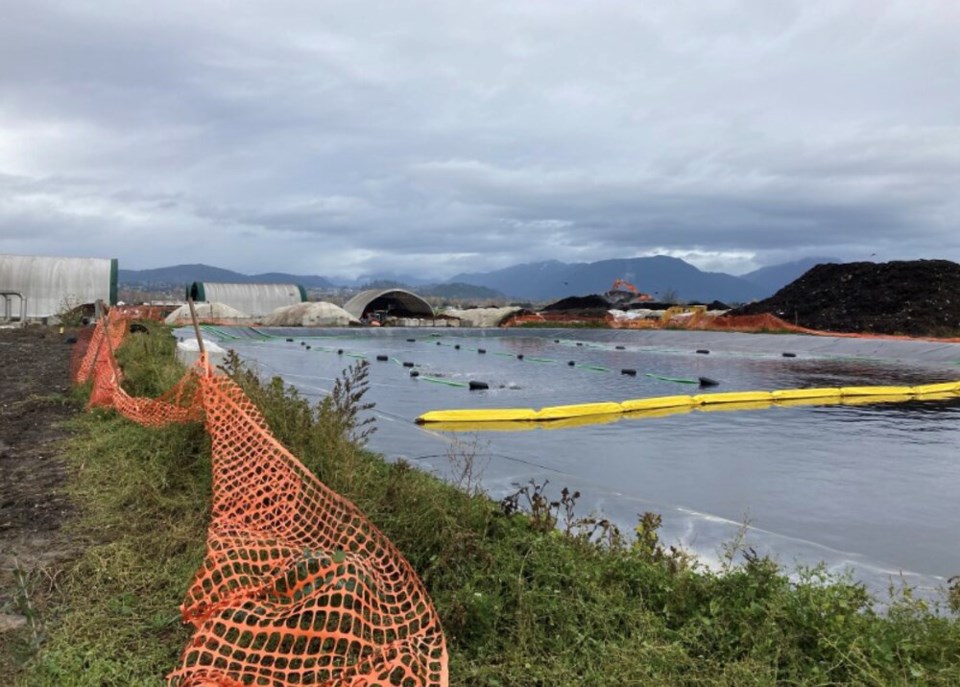A B.C. composting facility has been penalized nearly $120,000 for leaking effluence into ditches that ultimately drain into the Fraser River and the nearby Matsqui Slough.
The “major” penalties were handed to Pacific Coast Renewables Corp., a facility that transforms plant matter, wood, food and yard waste, as well as red meat and poultry carcasses into compost. The company was formerly known as Net Zero Waste Abbotsford.
The $119,695 in monetary sanctions date back to 2021 and 2022, when nine discharges exceeded the Abbotsford facility’s permit limits on biochemical oxygen, chloride, escherichia coli (E. coli), fecal coliforms, phosphorus, and suspended solids, according to a recent decision from the Ministry of Environment and Parks.
At the low end, phosphorous was found to climb 16 per cent above the permit limit; at the high end, fecal coliform levels were found to spike 129,900 per cent above the provincial limit.
Ammonia levels were found to spike as high as 1,449 per cent above B.C. water quality guidelines. Further breaches were found when investigators tested for aluminum, arsenic, cadmium and iron.
'Severe deviation'
In her decision, director of the Environmental Management Act Stephanie Little wrote the "exceedances" were “not isolated or marginal” but “occurred repeatedly.”
“Notably, 89 per cent of the individual exceedances were more than double the permitted threshold, underscoring a severe deviation from acceptable standards,” Little said.
A test on Jan. 20, 2022, resulted in 50 per cent mortality for Rainbow trout when swimming in only a 6.25 per cent effluent concentration, the decision notes.
Little said the acute toxicity levels suggest a medium to high likelihood that the discharges could damage near and downstream ecosystems “either directly harming species or degrading water quality to levels that could affect various organisms over time.”
In some cases, the company failed to notify the ministry of the discharges and did not stop them. When the ministry recommended measures to minimize stormwater from contacting compost at the facility, the company failed to follow the advice of a qualified professional on site, the decision says.
Little found the company gained more than $42,000 in economic benefit from failure to prevent the effluent discharges.
'Conflated' leachate and stormwater
Pacific Coast Renewables responded to the claims stating it had not intentionally discharged the water into the environment. The company said the ministry had “conflated” leachate and stormwater.
But Little said the company’s position did not address contaminated discharges leaking directly from the facility, nor its apparent gap in control measures.
In submissions, the company said it reached an agreement with the City of Abbotsford to process water during the wet fall and winter months, but that the city declined to renew the agreement in 2023.
“The site has no control over precipitation and only limited ability to store excess stormwater run-off without major on-site ponding and flooding,” it wrote.
The penalties do not include any contraventions that may have occurred when an atmospheric river hit B.C. in November 2021, flooding many parts of the province and causing billions of dollars in damage.
'Leachate interception trenches'
The company said it has made a number of improvements to the site. Among those, they listed the construction of “leachate interception trenches” and concrete walls around all outdoor compost piles that are active. The company also bought a street sweeper to clean the facility’s surfaces and roadways
Little agreed work at the site had improved the company's ability to prevent further breaches and lowered the recommended penalty.
In July 2021, Pacific Coast Renewables applied to amend its permit to account for a digester and renewable natural gas system that would capture waste gas and convert it into fuel. The application, which has not been finalized, would increase the facility’s capacity and decrease effluent discharges, according to the decision.
Last year, Natural Resources Canada awarded the company $10.5 million from its Clean Fuels Fund to develop the renewable gas project.
Pacific Coast Renewables has 30 days to appeal the penalties.




